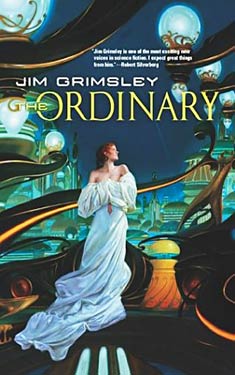Jim Grimsley
Completed 5/1/2020,
Reviewed 5/1/2020
3 stars
This book
takes place in the same universe as Kirith Kirin, though it is not a sequel. It has some of the same strengths as its
predecessor and suffers from some of the same faults. Specifically, its prose is outstanding, but
too much so. In place of suspense and emotional
depth, we get paragraph after paragraph of wordy world-building. It becomes a snooze-fest. It’s a shame, because the concept of the book
is inventive. There are two worlds on a
distant planet joined by a portal. The two
worlds are very different: one is based on science and has developed from an
Earth colony ship, and the other is based on magic and seems to have been there
forever. Unfortunately, it’s just not
gripping. Nonetheless, the book was
nominated for the Gaylactic Spectrum Award, and like its predecessor, it won
the Lambda Literary Award.
 The story
begins with Jedda, a translator from Senal, the science world, taking a
delegation through the portal to Irion, the magic world, under the guise of enhancing
trade between the worlds and bringing more people from Senal to Irion. They are to meet with Malin, the Thaan of
Irion. Eventually Malin shows up and
accuses them of actually being a scouting team in advance of a war force. Tensions build and the team is poised to be
sent back to Senal. But Jedda and a few
others remain. And Jedda, who has just
been a simple translater, trader, and observer up to this point, has a destiny that
puts her at the center of the conflict, and in the middle of the history of
Irion itself.
The story
begins with Jedda, a translator from Senal, the science world, taking a
delegation through the portal to Irion, the magic world, under the guise of enhancing
trade between the worlds and bringing more people from Senal to Irion. They are to meet with Malin, the Thaan of
Irion. Eventually Malin shows up and
accuses them of actually being a scouting team in advance of a war force. Tensions build and the team is poised to be
sent back to Senal. But Jedda and a few
others remain. And Jedda, who has just
been a simple translater, trader, and observer up to this point, has a destiny that
puts her at the center of the conflict, and in the middle of the history of
Irion itself.
Like the
world-building, the plot is decent. When
the plot advances, the book is engrossing.
Unfortunately, the prose gets in the way of the plot. There is simply too much description for the
book’s own good. Initially, the prose
seems gorgeous. After a while, it
becomes extraneous. You just want
something to happen, and it feels like it takes for ever for actions to
complete. I found myself alternately
reading aggressively and falling asleep through the whole book. Even the ending feels like it takes way too
long.
The
character development isn’t too bad. It’s
easy to like Jedda. She’s pretty easy
going and a bit cynical. She loves
languages and does a good job as translator.
My biggest problem with her is that I don’t ever get very attached to
her. Again, the prose gets in the way of
developing an emotional relationship with her.
Jessex/Irion is a decent character as well. He was the lover of the late king and is the
greatest magician in Irion. Yes, the
land and man have the same name. His origin
story is told in Kirith Kirin. Malin actually
gets a bit more character development. She
starts out as an aggressive ruler. Then,
late in the book, we get a section wholly devoted to her backstory. I still didn’t feel any emotional connection
to her, but she has some more depth to her than Jedda and Jessex. I think the depth comes from the fact that
her backstory is told a lot more quickly than the rest of the book. There is less prose to muddy it up.
The form of
the book is interesting. It is divided
into four parts. The first two parts are
told from Jedda’s point of view. It
bounces her back and forth through time.
She meets Malin in the present, then meets her again in the past. Then the third part is Malin’s
backstory. It’s relatively brief but
gets her from being a teenager up to the time Jedda is sent back to the
present. Then the two come together for
the fourth part. Unfortunately, there’s
no climax. The end fizzles rather than
pops. Any excitement I had at the end of
the third part, waiting for the two points of view to come together, just dies anticlimactically. It was very disappointing.
I still give
the book three stars out of five. It’s
not a bad book. It’s just boring. When I look at the quality of the prose, I
wonder how can I give this book only three stars compared to other books I’ve
given three stars to that have lesser prose?
That’s actually a trap I don’t necessarily want to get caught in, i.e.
comparing books by their ratings. I did
think about it this time, though, and decided to stick to my initial assessment. Some books are not well written but are still
fun to read. Other books have great
ideas that are poorly executed and can be equally fun to read. This book had excellent prose and
world-building but was not fun to read.
Different kind of mess; a definite three stars.
No comments:
Post a Comment